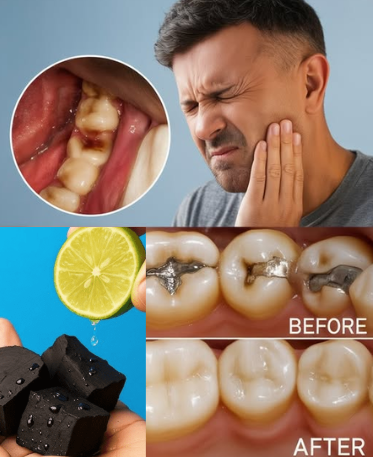
Many of us only think about our teeth when a sharp pain or sensitivity strikes. Yet tooth health is more than just aesthetics—it’s a key part of overall wellness. Cavities, also called dental caries, occur when bacteria, acid, and sugar slowly erode the enamel, the protective outer layer of your teeth. While advanced cavities require a dentist’s intervention, there are natural, research-backed ways to protect your teeth and even reverse early decay right at home.
Understanding Cavities and Early-Stage Repair
A cavity begins when harmful bacteria in your mouth produce acids that wear down enamel. If detected early, before the decay penetrates deeper, you can often remineralize enamel naturally. The American Dental Association (ADA) confirms that early-stage cavities can sometimes be reversed with improved oral hygiene, proper nutrition, and consistent dental care. The trick is catching the problem before it escalates.
Signs You May Have an Early Cavity
Early detection is your best defense. Watch out for these warning signs:
- Sensitivity to hot, cold, or sweet foods
- Small white or brown spots on your teeth
- Mild discomfort when biting down
- Rough or uneven enamel surfaces
Spotting any of these signs early gives you the chance to act before serious damage occurs.
Focus on Remineralizing Foods
While tooth enamel can’t grow back, minerals can be redeposited into weakened areas. Eating the right foods helps this natural repair process:
- Calcium-rich foods: Milk, cheese, yogurt, and leafy greens strengthen enamel.
- Phosphorus sources: Eggs, fish, lean meats, and nuts support mineral rebuilding.
- Vitamin D: Enhances calcium absorption; found in salmon, fortified foods, or sunlight.
- Fluoride: Drinking fluoridated water or using fluoride toothpaste helps harden enamel.
Research in the Journal of Dental Research highlights that diets rich in calcium and phosphate can improve enamel hardness, helping protect teeth from acid attacks.
Practice Optimal Oral Hygiene
Even the healthiest diet won’t fully protect teeth if oral hygiene is lacking. Follow these ADA-recommended steps:
- Brush twice daily with fluoride toothpaste for at least two minutes.
- Floss once daily to remove plaque between teeth.
- Use a fluoride mouth rinse for additional protection.
Extra tips: choose a soft-bristled toothbrush and replace it every 3–4 months to ensure optimal cleaning without damaging enamel.
Video : How To Reverse a Cavity at Home | Cure Tooth Decay
Limit Sugar and Acidic Foods
Sugar is a primary fuel for the bacteria that create cavities. Reduce consumption of:
- Candy, soda, and sweetened drinks
- Processed baked goods
- High-sugar fruit juices
If you indulge occasionally, rinse with water afterward and wait 30 minutes before brushing to prevent further enamel erosion.
Try Xylitol as a Sugar Substitute
Xylitol, a natural sweetener in some chewing gums and mints, can reduce cavity-causing bacteria. Studies in Caries Research show that xylitol use lowers the risk of new cavities. Chew sugar-free xylitol gum for 5–10 minutes after meals to stimulate saliva, which neutralizes acids and protects enamel.
Stay Hydrated with Water
Saliva is essential for washing away food particles and maintaining a healthy pH in your mouth. Drinking enough water—especially fluoridated water—supports saliva production and strengthens teeth. Keep a water bottle handy and sip throughout the day to maintain oral health.
Use Remineralizing Toothpaste or Gel
Some over-the-counter products contain nano-hydroxyapatite or calcium phosphate to help remineralize early decay. These work best when combined with regular fluoride toothpaste and consistent oral care.
Schedule Regular Dental Checkups
Even with natural strategies, routine dental visits are essential. Dentists can:
- Spot early decay you may not notice
- Apply professional fluoride treatments
- Give personalized advice to maintain oral health
Prevention is always simpler—and cheaper—than treating advanced cavities.
A Daily Routine for Stronger Teeth
Consistency is key. Here’s a simple plan:
- Morning: Brush with fluoride toothpaste, drink a glass of water.
- After meals: Rinse with water or chew xylitol gum.
- Evening: Floss, brush, and use a fluoride mouth rinse.
- Weekly: Include multiple calcium-rich meals.
- Monthly: Check teeth in the mirror for color or texture changes.
Video : How to Never Get Another Cavity Ever Again
The Bottom Line
Early-stage cavities can sometimes be managed naturally, but timing is everything. By combining remineralizing foods, optimal oral hygiene, smart lifestyle choices, and professional dental care, you can strengthen enamel and prevent cavities from worsening.
While you may not eliminate all dental visits, these habits can reduce the need for invasive procedures, keeping your smile healthy and your wallet happy. Protecting your teeth is a daily investment that pays off for a lifetime.


